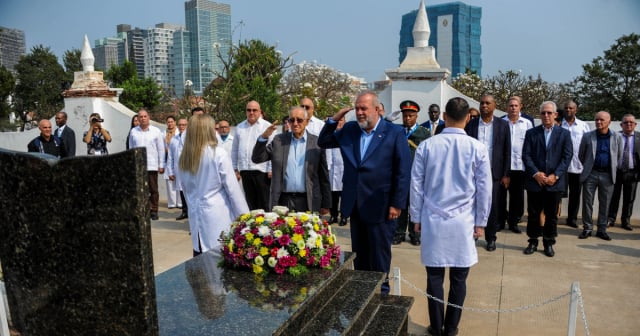Cuban Prime Minister Manuel Marrero assured in an interview granted to the Iranian television channel Hispan TV that in five years he sees Cuba "in a much more favorable situation." He explained that the regime is convinced that the path it has laid out, although "very hard" and "very difficult," will bear fruit because "the revolution has gone through more difficult times and has achieved victory."
For this, they have the international help of the "allies," he said in reference to countries like Venezuela, which is immersed in a political crisis following electoral fraud; Iran, entangled in the conflict with Israel; or Russia, involved in the war in Ukraine.
"We never promised our people what we will not be able to give," stated the prime minister, assuring that they will proceed "little by little" and "steadily," "facing all challenges," "until victory always," and confident that they are "going to advance," he added in an interview where he also addressed current issues such as Cuba's unconditional support for Maduro's fraud in Venezuela.
Marrero made these statements, which have been echoed by the program Mesa Redonda, during a "working" visit to Iran (from July 29 to 31) and Angola. In the latter country, he was received by the Secretary of State for Administration, Finance, and Heritage, María Fragoso Pascual Ramiro (a position lower than that of minister), and by the Angolan ambassador to Cuba, María Cándida Teixeira. Accompanying Marrero were, among others, the first deputy minister of the Armed Forces, Army Corps General Ramón Espinosa Martín, and the Executive President of Corporación Antex S.A., Carlos Santiago Martínez Rodríguez.
The prime minister headed the Cuban delegation that participated in the inauguration ceremony of the president of Iran, Masud Pezeshkian, on July 30. Additionally, according to Minrex, he met with entrepreneurs from this country and with solidarity groups with the Cuban regime.
Invited to the Round Table, Ambassador Carlos Miguel Pereira, Director General of Bilateral Affairs of the Cuban Foreign Ministry, called Marrero's visit to Iran "historic" because it is the first he has made as Prime Minister and also because it continues a "historic" year in relations between the two countries, such as 2023, which included a State visit by Miguel Díaz-Canel in December of last year, after the late Iranian President Ebrahim Raisi visited Cuba and signed a "significant number" of agreements on the Island.
Basically, this visit by Marrero sought to reaffirm all those agreements, although the regime disguises it by saying that he went to "ratify Cuba's willingness" to continue collaborating with the Iranian government, something that Marrero reportedly did, according to Carlos Miguel Pereira, during his meeting with the new president Pezeshkian.
Marrero's opinion that Cuba will be better in five years adds to the string of promises made by the Cuban government that were not fulfilled during the first half of 2024. Far from acknowledging the failure, the Executive promised new projections for the second half of the year.
"The work system has to change; it cannot be the same as we had in the first semester," said Marrero at a meeting of the Council of Ministers, including in that change the eternal battle against bureaucracy and the slowness of procedures on the Island.
At the beginning of this year, while the concern of the Cuban people was growing over the rising prices of fuel and services such as transportation, electricity, and liquefied gas, Miguel Díaz-Canel continued to say that they will triumph and overcome.
In April, the Cuban leader promised "better times" with "effort and creative resistance." However, those times do not seem to be near, considering that tourism, one of the main income-generating sectors for the country, continues to struggle, with a new year-on-year decline from January to July of this year.
Sixty-five years after coming to power, the Cuban communists continue with the same promises that have resulted in record emigration figures in the last year and the prediction that by 2100, the population of the Island will drop to 6 million people.
What do you think?
SEE COMMENTS (4)Filed under:
